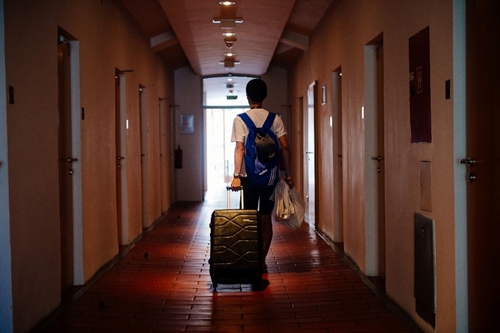A night behind bars in Slovenian prison-turned-hostel
 |
| A tourist walks through a hallway on the way to a room at the hostel ’Celica’ in Ljubljana, Slovenia -AFP Photo |
The technicolour building in Ljubljana was originally a jail built by the occupying Austro-Hungarian army in 1882 and remained in use until Yugoslavia fell apart in the early 1990s. When Slovenia became independent in 1991, a group of artists and squatters prevented the building’s demolition, opening the way a metamorphosis into Hostel Celica, which means "cell" in Slovene, in 2003.
"The main concept of Celica is: through art and architecture heal a place so to give in a new energy, turning something negative into its complete opposite, into something positive and open," project manager Tanja Lipovec said.
And not only that. Each of its 20 cells, complete with bars on the door and windows, has been turned by more than 80 local and international artists into spaces that are all unique.
To add to the prison feeling, guests are assigned their cells by the management in the same way that prisoners could not choose their cells back in the day. And all free of charge, its website jokes.
Sustainable tourism
That though doesn’t stop what is a common sight at the hostel: guests peering through the bars into other cells to see which one they would like next time.
While the cells are doubles and triples, there are also two 12-bed and six five-bed dormitories. And with the hostel not being "average", as Lipovec puts it, the clientele are not just the 18-25 crowd that typically stay in hostels.
They include older people, including families or elderly travellers staying in Ljubljana, this year’s European Union "Green" capital.
"People that come to Celica are not always budget travellers. They are people willing to pay more because they are aware of the added value they are getting back," Lipovec said.
"Just knowing that it was a prison before and how they turned it into a hostel, the history itself is amazing. Just spending the night here, that’s great," said visitor Russel Pineda, 28, from California.
With prices ranging between 18 and 33 euros ($20-37) per bed per night, Hostel Celica is reasonably priced -- although guests have to share bathrooms.
Solitary confinement cell
But it also provides the satisfaction of staying in the world’s first eco-friendly hostel to be awarded with the Gold Travelife certificate for sustainability in tourism.
Along with recycling, re-using materials, monitoring the cost of energy and using green energy, the Travelife criteria also cover issues like human rights, child protection and employee welfare. "It’s the awareness of how you can benefit back to the local community where you are located and that you are aware of the preciousness, the importance of the local environment," Lipovec said.
Those wanting an extra-special experience can venture down to the basement, home to a former solitary confinement cell in the basement.
Left as it was in the past, cold and without windows and with original graffiti and scratches on the walls, it’s far from five-star.
What the stars mean:
★ Poor ★ ★ Promising ★★★ Good ★★★★ Very good ★★★★★ Exceptional
Latest News
More News
- Vietjet launches mega year-end ticket promotion (December 10, 2025 | 11:33)
- Vietjet launches daily Manila flights to celebrate year-end festive peak season (December 05, 2025 | 13:47)
- Phu Tho emerges as northern Vietnam’s new tourism hub (December 01, 2025 | 17:00)
- Vietjet completes Airbus A320/A321 updates ahead of deadline (December 01, 2025 | 09:49)
- Vietjet resumes Con Dao flights from early December (November 28, 2025 | 15:24)
- Free tickets, Lunar New Year promotions on offer at Vietjet Mega Livestream (November 26, 2025 | 15:32)
- UNIQLO unveils upgraded heat-retention wear at Hanoi event (October 26, 2025 | 10:00)
- Vietnam named among world’s top four culinary destinations (October 24, 2025 | 17:09)
- Vietnam and Denmark strengthen dialogue on sustainable fashion (October 20, 2025 | 09:11)
- Fusion rolls out special initiatives to celebrate Vietnamese Women’s Day (October 17, 2025 | 20:00)
















 Mobile Version
Mobile Version